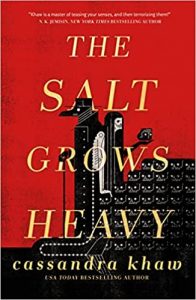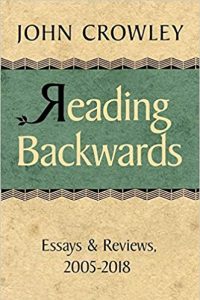Gabino Iglesias Reviews The Salt Grows Heavy by Cassandra Khaw
 The Salt Grows Heavy, Cassandra Khaw (Tor Nightfire 978-1-25083-091-3, $21.99, 112pp, hc) May 2023. Cover by Morgan Sorensen.
The Salt Grows Heavy, Cassandra Khaw (Tor Nightfire 978-1-25083-091-3, $21.99, 112pp, hc) May 2023. Cover by Morgan Sorensen.
Cassandra Khaw is one of the most distinctive voices in contemporary fiction. From science fiction to horror and from literary fiction to surrealism, they can do it all, and their prose is always impeccable. With The Salt Grows Heavy, Khaw has pushed their work into new territory, and it’s a place where the narrative stretches ghost limbs that let you know there’s much more than what’s on the page and where a special kind of brutal poetry has replaced straightforward storytelling and created an engrossing, increasingly bizarre tale.
The Salt Grows Heavy follows a mermaid who came to shore and married a prince, but that was the end of the fairy tale. This mermaid has pointy teeth, her daughters destroyed the kingdom, and now she’s on the run in the taiga with a mysterious, nonbinary plague doctor. As they move through the cold subarctic forest, they encounter a group of children playing a violent game, and the encounter takes them to a strange village full of death where the children kill each other regularly in a game they can come back from and where they follow three ‘‘saints’’ who control them. The mermaid and the plague doctor are used to being the predators, but this place changes things, and they must accept that and adapt in order to survive.
This novella tells an interesting story, but what will stick with readers is its combination of brutality, strangeness, gorgeous prose, and atmosphere. Khaw’s characters and the dialogue between them is often interesting and possesses a bizarre humor, the mermaid and the plague doctor’s stories go above and beyond what little is present in the narrative, and the world they inhabit and people they encounter are complex enough to fill entire novels despite the scant few details readers get. This might sound like the novella feels too short, too small for everything it contains, but the opposite is true. The work Khaw did on the sentence level and the way they stripped down the story until all that was left was a shiny skeleton makes this a superb, satisfying read that pulls readers into an uncanny world and then drags them across the taiga and into a bizarre nightmare that, thanks to their author’s use of language, is simultaneously unique, magical, and ruthless.
Stepping into The Salt Grows Heavy is like stepping into someone else’s fever dream. This strange, dark, violent, lyrical novella contains some of Khaw’s most brilliant, elegant, haunting writing: ‘‘For all that humanity professes to delighting in its own sophistication, it longs for simplicity, for when the world can be deboned into binaries: darkness and light, death and life, hunter and hunted.’’ The use of language is immaculate, but that doesn’t detract from the great pacing. The prose is lyrical and flows like water from a broken vase, but that doesn’t diminish the impact of the gore, murders, and scenes of surgery and self-mutilation. The taiga’s cold is brutal, and the small village is a bare-bones place where life seems to barely hold on, but the wealth of details Khaw injected into the narrative rivals that of any 400-page novel. In short, this is a novella that feels much larger than its word count and shows a very talented storyteller at the height of their powers.
While Khaw achieves a lot here, the most impressive thing about The Salt Grows Heavy is the way it comfortably occupies so many interstitial spaces and mixes elements that are rarely smashed together. Stories where people cut pieces of themselves and perform self-enucleation aren’t normally called described as being heartbreaking, but this book demands to be called just that. Narratives about strange ‘‘saints’’ who repeat what the others say, mermaids, and strange plague doctors shouldn’t feel like they’re scathing looks at humanity, but this one is. Tales in which kids are murdered by their friends and then brought back shouldn’t feel so heartfelt, but The Salt Grows Heavy definitely does.
With their previous books – the horror novella Nothing But Blackened Teeth, the horrific Hammers of Bone and A Song for Quiet, and the brutal and wildly entertaining science fiction novel The All-Consuming World – Khaw has shown they can do it all, but The Salt Grows Heavy cements them as one of the most exceptional voices in speculative fiction. I can’t wait to see what they do next.
Gabino Iglesias is a writer, journalist, professor, and book reviewer living in Austin TX. He is the author of Zero Saints and Coyote Songs and the editor of Both Sides. His work has been nominated to the Bram Stoker and Locus Awards and won the Wonderland Book Award for Best Novel in 2019. His short stories have appeared in a plethora of anthologies and his non-fiction has appeared in the New York Times, the Los Angeles Times, and CrimeReads. His work has been published in five languages, optioned for film, and praised by authors as diverse as Roxane Gay, David Joy, Jerry Stahl, and Meg Gardiner. His reviews appear regularly in places like NPR, Publishers Weekly, the San Francisco Chronicle, Criminal Element, Mystery Tribune, Vol. 1 Brooklyn, the Los Angeles Review of Books, and other print and online venues. He’s been a juror for the Shirley Jackson Awards twice and has judged the PANK Big Book Contest, the Splatterpunk Awards, and the Newfound Prose Prize. He teaches creative writing at Southern New Hampshire University’s online MFA program. You can find him on Twitter at @Gabino_Iglesias.
This review and more like it in the July 2023 issue of Locus.
 While you are here, please take a moment to support Locus with a one-time or recurring donation. We rely on reader donations to keep the magazine and site going, and would like to keep the site paywall free, but WE NEED YOUR FINANCIAL SUPPORT to continue quality coverage of the science fiction and fantasy field.
While you are here, please take a moment to support Locus with a one-time or recurring donation. We rely on reader donations to keep the magazine and site going, and would like to keep the site paywall free, but WE NEED YOUR FINANCIAL SUPPORT to continue quality coverage of the science fiction and fantasy field.
©Locus Magazine. Copyrighted material may not be republished without permission of LSFF.







